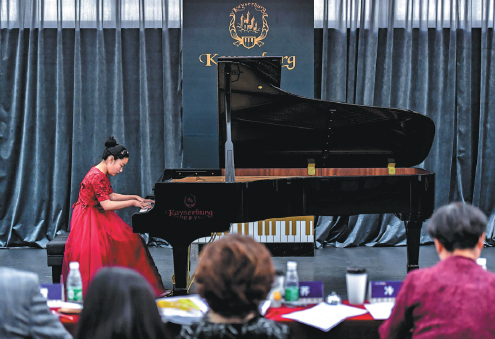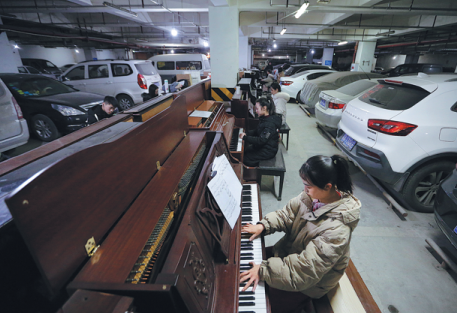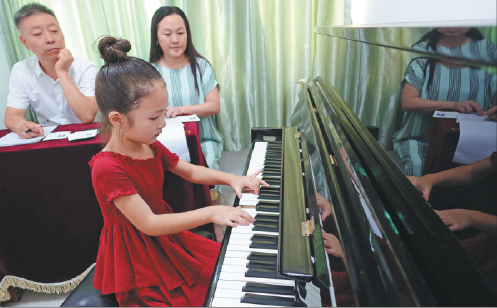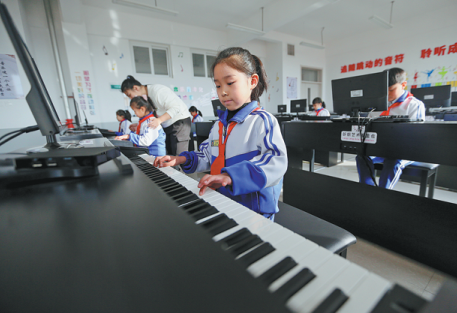Parents see piano as a key to unlock success

Many believe children's intellectual abilities can be boosted by learning the instrument. Zhao Xinying reports.
Guo Yujing hasn't touched her piano for two years.
That would have been unimaginable when she was learning to play the instrument from the ages of 5 to 15.
At that time, Guo practiced for at least two hours a day. When an exam drew near, she spent all day-with the exceptions of mealtimes and sleeping-studying the black-and-white keys.
That lasted until 2010, when Guo passed the Grade 10 exam, the highest level for students.
Success of this type is a satisfying achievement in the eyes of many Chinese parents, and also a sign that they can temporarily call a halt to the piano studies of their often unenthusiastic children.
Guo's school life became increasingly busy after she started the ninth grade, meaning she rarely sat down at the piano her parents had bought when she started learning the instrument.
Instead, it stood abandoned in a corner of the family home in Wuxi, Jiangsu province.
The 24-year-old, who is set to graduate from postgraduate school soon, is interning at a video games company in Shanghai.
She said the piano is now something she can only see and touch when she visits the family home.
Statistics from the Chinese Musicians Association show that the number of children in the country learning to play piano exceeded 30 million in 2016, and the figure has risen by 10 percent every year since then.
Despite growing student numbers, online news portal ThePaper cited music industry reports that show about 10 percent of learners born in the 1990s rarely touched the instrument after they completed all the exams. Guo is among their number.
Motivation
In the 1990s, Zhou Haihong, then deputy director of the Central Conservatory of Music in Beijing, conducted a survey of 1,000 parents. Almost all said they sent their children to learn piano because they believed it could boost intellectual development and cultivate a good temperament.
As a professor at a leading music school, Zhou said his research provided no conclusive evidence for the commonly held belief that "there is a correlation between playing the piano and children's intellectual development".
However, almost three decades later, Liao Yi, a voice and music teacher at an arts training center in Beijing, still finds that parents' obsessions with improving their children's mental abilities play a key role in their desire to get them on board with the expensive and time-consuming project.
Having lived with the piano since age 7 and made the instrument part of her professional life, the 37-year-old often receives invitations from parents to teach their children.
"When I ask them why they want their kid to learn piano and whether the child likes it, they say they have no idea but they have heard that practicing the piano is helpful for children's development," Liao said.
Liu Bingru signed her daughter up for piano courses two years ago, partly because the then 6-year-old primary school student was "bad at math, especially arithmetic".
"I had heard that playing the piano might be of some help as it can train children's brains by exercising their fingers," Liu said.
Now, two years later, she is delighted to find that the child's playing and math skills are both improving.
"One unexpected outcome is that whenever she encounters a difficult math problem, I can guide her to think by way of the piano keys," she said.
"By counting numbers like counting musical scales, she can quickly figure out the answer."
Guo's childhood experience was very similar-her extracurricular options were chess or the piano. While her real passion lay in the former, her mother chose the latter on her behalf.
"She believed that playing the piano was elegant and more suitable for girls," Guo said.
"Also, she wanted me to master a practical skill in case I couldn't find a decent job when I grew up. If that happened, she thought that at least I would still be able to make a living by teaching others."
A tough path
While some parents may have planned to encourage their children to become piano professionals, very few kids who learn the instrument actually follow a professional path as adults.
Reports from within the music education industry show that only about 5 percent of Chinese children who take up the instrument in childhood will make a career out of playing or teaching, ThePaper reported.
Liao said many factors lead to such a result-the main one being that becoming a professional pianist requires a great deal of talent, but very few children have such deep natural ability.
She said talent on the piano can be reflected in many ways, such as the player's ability to control their fingers, to read and process musical scores, to identify the notes they hear and to express their feelings.
"The differences between individuals in each aspect can be very large, and only those who excel at almost all of those things will meet the threshold to work toward a professional career," she said.
"Also, it relies greatly on teachers and coaches, as well as parents, to detect children's talent and tap their potential on the piano.
"Obviously, these conditions are only the basics. To become a professional pianist, you have to go through years of repeated and dull training and practice."
Gao Jie holds a master's in piano performance. The 24-year-old music teacher at a middle school in Hefei, Anhui province, said she wouldn't have entered the field if it hadn't been for her two bo le, or talent scouts.
"One was my music teacher at primary school, who discovered that I was the only one in my class who could sing what I heard exactly (which indicated that she had "perfect pitch"; the ability to recognize notes without the use of reference points). It was at the recommendation of this teacher that I started to learn the piano," she said.
The other prime influence was her piano teacher, who encouraged her to continue learning, practicing and pursuing a professional path after she started high school.
A hobby and a comfort
For many people, playing the piano is just a hobby and a way to enjoy themselves.
Huang Xiaoman, from Dongguan, Guangdong province, had intensive piano training for 10 years.
When she finished her last piano exam at age 15, she thought she was "free" because an arduous decade of being forced to practice by her mother had finally come to an end.
She was happy to stay away from the instrument for a long time.
However, one day in high school she felt under great study pressure and wanted to relieve the stress by playing the piano, said the 22-year-old postgraduate, who is majoring in simultaneous translation.
"It was the moment I realized that the thing I had been reluctant to do back in my childhood was, in fact, worthwhile," she said.
"I didn't imagine that it would become my way of relaxing and seeking comfort."
From then on, Huang started playing purely for fun. She practiced The Wedding March hundreds of times in the hope of performing at a relative's wedding someday. She also tried to play the original soundtracks of popular TV dramas she enjoyed.
"Although I didn't grow up to be a professional pianist, I still feel fortunate to have spent time on it," Huang said.
"It has become fully integrated in my life, like a friend or pet who is always there and somewhere I can get comfort whenever I need it."
Contact the writer at zhaoxinying@chinadaily.com.cn


























